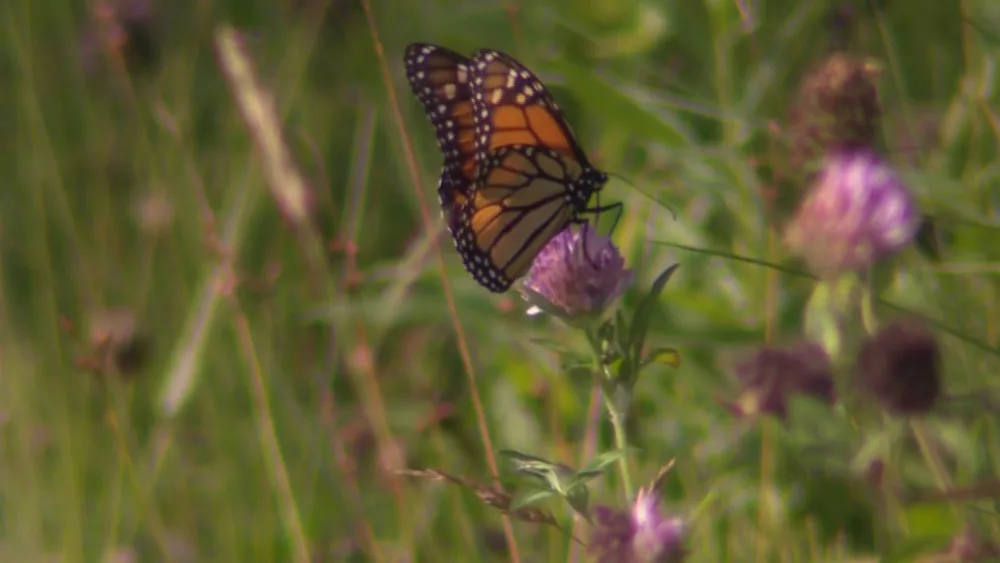MONTPELIER, Vt. (WCAX) – Is a problematic pesticide harming Vermont’s pollinators? Experts say yes, but there’s concern that a proposed bill restricting the use of the chemicals could harm farmers’ bottom lines.
Samantha Alger with the Vermont Bee Lab spent the last three years harvesting pollen from honey bee colonies across Vermont. Her goal was to test the tiny golden nuggets for pesticides.
“Time and time again, this question came up about whether the Vermont honey bee population or bees in Vermont are being exposed to neonicotinoid residues, and we didn’t have really any good data on this,” Alger said.
Neonicotinoids, or neonics, are one of the most frequently used kinds of pesticides in the U.S. They’re typically used to treat seeds like corn and soy to keep pests at bay. According to Vermont’s 2022 seed report, 53% of seeds sold in Vermont that year were treated with neonics.
But neonics don’t just kill pests, studies show the chemicals are toxic to birds, bees, and other pollinators. Neonics can also spread beyond farms, leaching into soil and waterways, where they can do more damage.
Alger set out to learn whether honey bee pollen contains neonics. “By doing that, we get a snapshot of what the bees are coming in contact with and what they’re bringing back to the hive to eat and to feed their developing babies,” she said. Her findings: of 61 pollen samples collected in 2023 — nearly 30% contained neonics — with dozens of other pesticides detected.
A new bill at the Vermont Statehouse could limit neonic use. H. 706 would restrict neonic-treated soy and grain seeds and several other neonic uses by 2029. Vermont farmers wouldn’t be able to buy or sell neonic-treated seeds, though the state could issue exemptions when untreated seeds aren’t available. If approved, Vermont would be the second state to significantly regulate neonics, right on the heels of a similar law in New York passed in December.
Steven Dwinell with the Vermont Agency of Agriculture, Food & Markets says many dairy farmers who rely on neonic-treated seeds are wary of the proposed neonic restrictions. Research shows it’s hard to find seeds that aren’t treated with neonics and farmers worry pests would destroy their crops. Dwinell recognizes the dangers of neonics but is concerned about the fallout from farmers. “People forget that pesticides are used to control pests. You know, pests have impacts. If you don’t have those tools, then you could have some serious problems,” Dwinell said.
Rep. Robin Chesnut-Tangerman, D-Rutland-Bennington, the sponsor of H. 706, believes the timing of the bill could ease farmers’ concerns. New York has significantly more agricultural land and neonic-treated crops than Vermont. Vermont alone may not influence the seed market to offer alternatives to neonic-treated seeds, but Chesnut-Tangerman believes The Empire State could. “I thought, well, here’s our opportunity to piggyback onto a larger state that has a million acres under cultivation with treated seed, and they are large enough to actually drive change and development and distribution of alternative products,” he said.
With a five-year window before neonic restrictions would go into effect, Chesnut-Tangerman believes there’d be ample time for farmers — and the market — to adapt.
Dwinell and Chesnut-Tangerman agree that any solution must protect pollinators and farmers. “We have to figure out a way to do both. We need to mitigate any impacts from the use of the seed as well as provide the protection for the growers that they need,” Dwinell said.
“We don’t want to leave our farmers hurting, yet at the same time we want to protect our pollinators,” added Chesnut-Tangerman.
Samantha Alger was slated to testify Thursday morning to bring lawmakers up to speed about her research findings on pollinator health.
Related Stories:
Vt. beekeepers call state claims of thriving honeybees misleading
Land of milk v. honey: Dairy farmers lobby against banning pesticides that kill bees
Activists say more needs to be done to save bees
Activists to celebrate ‘bee-friendly’ legislation
Scott signs pollinator bill; supporters continue push for pesticide ban

